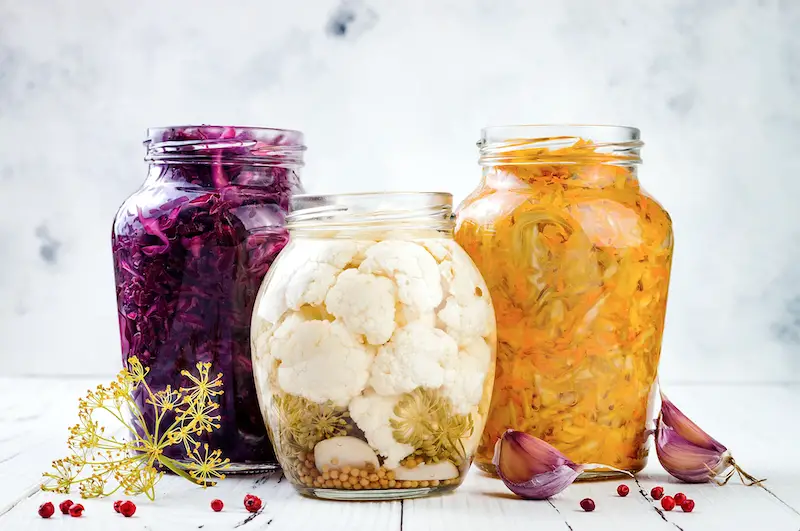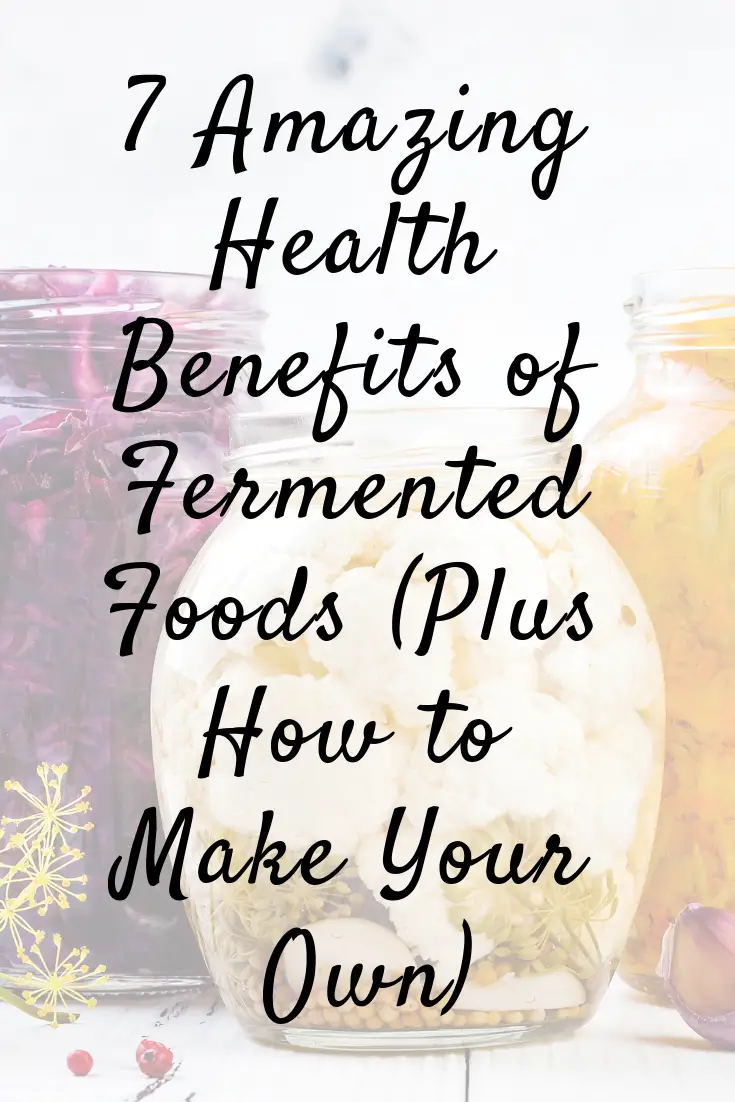

Fermented foods are popular for their gut-healing benefits for good reason. Research proves that they can introduce good bacteria to the gut, which helps the immune system function better, keeps digestive health in good shape, and provides other nutrients.
Let’s dig into the healthy benefits that fermented foods have to offer, plus a how-to guide to ferment your own.
What Are Fermented Foods?
Fermentation is an age-old process that was used to preserve food in the days before refrigerators and freezers existed.
It is also used to make foods and drinks like beer, cheese, sourdough bread, chocolate, yogurt, wine, and even coffee. It’s also required to make staple foods like sauerkraut, which is fermented cabbage.
These days we don’t need to ferment foods to preserve them, but they offer a myriad of health benefits which we know more about now because of modern research.
Fermented foods are also referred to as being “cultured” because of the way that they break down as beneficial bacteria are formed.
7 Health Benefits of Fermented Foods
Lactic acid bacteria are active in the fermentation process and are responsible for vitamins, minerals, and enzymes being synthesized during fermentation.
These lactic acid components also offer health benefits themselves. Fermented foods are antimicrobial, anti-inflammatory, anti-fungal, and also support healthy body systems such as the heart and digestive tract.
The health benefits of eating fermented foods are broken down as follows.
Boosting Friendly Bacteria in the Microbiome
The microbiome or the “gut” as it’s commonly referred to hosts an entire world of bacteria. In it, good and bad types reside, and in order to maintain balance and keep our health, we need to regularly replenish the good type.
A healthy microbiome supports digestion, immunity, elimination, and can help to address chronic health issues like thyroid disease, Crohn’s disease, and more.
Detoxing the Body
Our body is always eliminating toxins via the liver and kidneys, but certain foods can help the body optimize the process and make sure that the toxins are actually being removed.
Fermented foods help to bind with heavy metals and other toxins and help the body eliminate them.
Immune System Balancing
The immune system helps us to fight off illness, but it also regulates lots of other health aspects, too. When the immune system is not balanced, it can be too weak to defend us from viral invaders or it can be in overdrive where it attacks its own body tissues and organs.
Fermented foods help to provide balance for the immune system, which relies heavily on having a microbiome that is stocked with good bacteria. An immune system in overdrive can result in rheumatoid arthritis, Hashimoto’s thyroiditis, lupus, celiac disease, multiple sclerosis, and so much more.
Even if you already have one or more of these conditions, you can help to address your condition by working to get your immune system back into focusing on what it should be doing: destroying outside invaders and not your own tissues.
Improved Cognitive Function
The gut and the brain are so closely connected that disturbances in gut health can lead to brain fog and other mental issues. Boosting gut function can lead to a clearer head, better thinking ability, and even improved mood and mental health.
Nutritionally Rich
While there are many ways to boost nutrition intake, fermented foods are a dense source of many nutrients and are considered a superfood. This means you get more bang for your buck, or rather, bite.
Not only are fermented foods rich in the natural probiotics that our guts need, but the nutrients in them help the gut to make its own vitamins: specifically, B12, B6, biotin, and even vitamin K, which is essential for healthy blood.
Therapeutic for Skin Health
The skin isn’t just something that responds to topical treatments or the outside environment. It is also a reflection of what’s going on inside of the body, specifically, the gut.
Eating fermented foods can help to improve skin health and address skin conditions like acne, eczema, psoriasis, dry skin, and even dandruff.
Boosts Body’s Ability to Lose Weight
Fermented foods can also naturally aid in weight loss because they provide a balancing effect on blood glucose, which can lead to a natural reduction in appetite and food intake.
Additionally, having a healthy gut that is stocked with the right kinds of bacteria can optimize elimination and can help to naturally shed some weight that way, too.
7 Different Kinds of Fermented Foods
If you’re new to the world of fermented foods, you might be confused as to what types of foods contain these natural probiotics. Here’s a breakdown of the different kinds and what’s in them.
Sauerkraut
Sauerkraut is a traditional German dish that is made by fermenting cabbage. The cabbage ferments when it is compressed in a jar and sealed from air.
Bacteria ferment the natural sugars found in the cabbage and the result is a sour-tasting dish, usually of shredded cabbage, but many different vegetables can be fermented this way, including carrots, cucumbers, tomatoes, beets, and more.
Yogurt
Perhaps the most well-known fermented food, yogurt contains beneficial bacteria from a fermentation process. However, it also contains dairy and lactose, both of which can make it hard on a person’s gut if they’re sensitive.
Kefir
Popular among people who can’t tolerate all the dairy found in yogurt, kefir is a more soured version of milk that is rich in natural probiotics.
It can be made from milk, goat’s milk, sheep’s milk, or even coconut water.
Kimchi
A dish that originates from Korea, kimchi is a spicier version of sauerkraut, with typical vegetables included being cabbage, kale, radish, beets, cucumber, pineapple, and more.
Soy Sauce
True soy sauce is a fermented product that contains beneficial bacteria. However, most modern soy sauces aren’t fermented, which can make soy a hard-to-digest ingredient.
Natto
Natto is another fermented dish made from soy beans that not only has probiotic benefits, but can also help to reduce inflammation and support cardiovascular health.
Kombucha
While this isn’t a food, kombucha is a fermented tea beverage that contains beneficial bacteria much like the foods do.
However, there are a lot of kombucha beverages on the market today, and not all of them contain significant amounts of good bacteria and are loaded with sugar, flavorings, and other ingredients.
Make sure you read your labels before purchasing kombucha.
A Note About Fermented Products
While many of these products can be found on store shelves, many commercial varieties don’t actually contain live bacteria because the manufacturing process is done too quickly to allow for natural fermentation.
Even if they do contain some, they are typically loaded with sugar to offset the naturally occurring sour taste of fermented products. This excess sugar can cancel out the beneficial effects of fermented foods.
If purchasing fermented foods, make sure you check the label to find a statement that it contains live and active bacteria.
Also, read the label to see what other ingredients are included. It’s also important to note that all pickles, for example, aren’t fermented, as many are pickled with vinegar instead of natural bacterial fermentation.
How to Get Started Fermenting Your Own Foods
While it might seem easy to buy something off a store shelf that is ready to go, actual fermented products are expensive since they are time consuming for food companies to produce and package.
The good news is that you can ferment your own foods at home for little cost and without any special knowledge or training.
When fermenting your own foods, you will always want to start with organic produce that has been thoroughly washed and cleaned. This will give the cleanest product for the good bacteria to feed on to provide the gut-boosting benefits.
While fermentation kits are sold, with special jars and lids, you don’t have to get that fancy if you don’t want. You can use a simple glass jar of any size, although a medium sized one is good for your first fermentation project.
Before you begin, you’ll also want to make sure your jar is completely cleaned and rinsed, free from all soap residue. Again, you want a clean surface for the bacteria to be feeding in.
After that, your next need for home fermentation is a bacterial starter. That’s right, you need something that essentially sets the stage for the good bacteria that are going to be in your fermented foods.
You can get these from farmers markets, from fermentation workshops, or you can order them online or buy them at health food stores, typically in the form of a powder.
After you have those three essential items gathered: your cleaned veggies, your cleaned jar, and your bacterial starter, you are ready to ferment.
Once your veggies have been cleaned, you’ll want to shred or finely chop them. Then you’re going to toss them with whatever seasonings you want and sea salt.
Now it’s time to stuff them as tightly as possible into your jar, and then pour filtered water in until it reaches the top and covers the surface of the veggies. Cover the jar with a cheesecloth or something similar and set it in a cool, dark place for one or two weeks.
After your veggies have fermented to the desired level of sourness, you should store them covered in the fridge for up to six months.
A Note About Eating Fermented Foods
If you’re completely new to eating fermented foods, you’re going to want to start small. The gut can become sensitive to all of this bacteria and you can have symptoms of discomfort, bloating, gas, and other issues if you suddenly eat a large portion of fermented foods.
To introduce this good bacteria to your system, eat one tablespoon daily for a week or two, and then work up to two tablespoons. After a month or so of doing this, if you haven’t noticed unpleasant symptoms, you’re probably ready for a ¼ to ½ cup of fermented foods daily.


References:
https://www.health.harvard.edu/blog/fermented-foods-for-better-gut-health-2018051613841
https://www.ncbi.nlm.nih.gov/pubmed/28945458
https://www.sciencedirect.com/science/article/abs/pii/S095816691630266X
https://www.ncbi.nlm.nih.gov/pmc/articles/PMC5216880/
https://www.ncbi.nlm.nih.gov/pmc/articles/PMC3904694/
Aimee McNew, MNT, CNTP, is a certified nutritionist who specializes in women’s health, thyroid problems, infertility, and digestive wellness. She ate her way back to health using a Paleo diet, lost 80 pounds, and had a healthy baby after numerous miscarriages. She focuses on simple nutrition practices that promote long-lasting results.
